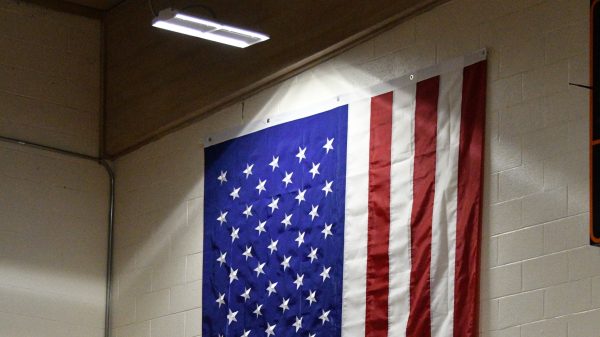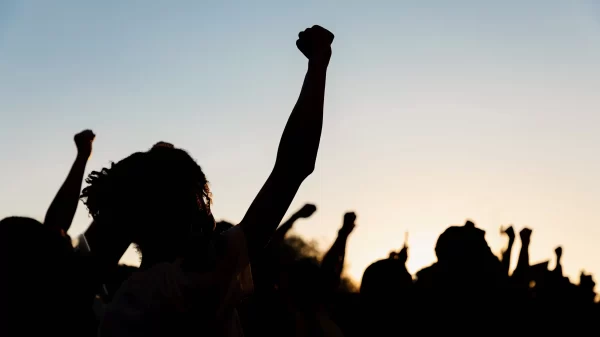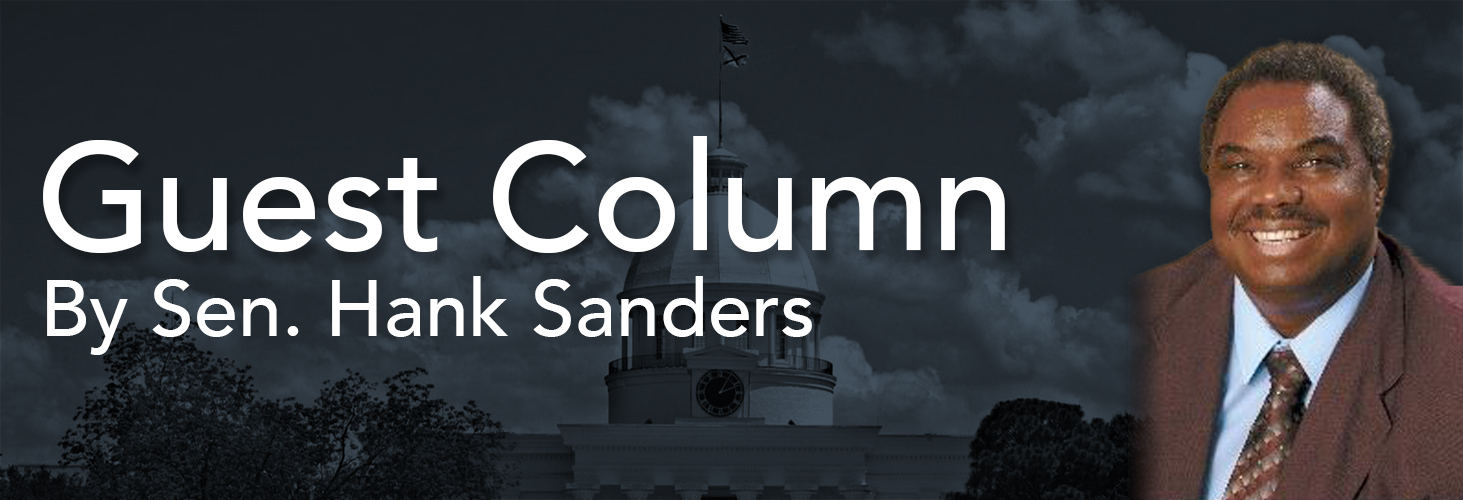By Sen. Hank Sanders
A nice house makes such a difference in our lives. I vividly recall the difference it made it my life. It changed the way I saw myself. It changed the way I saw my family. It changed the way my family saw me and others in the family. A nice house made a powerful difference in my life.
I know that in our moments of idealism we say that material things should not make a difference. Maybe they should not, but they do. An appealing house makes a powerful difference in our lives.
I see a difference between a nice house and a nice home. A house is a structure. A home is an institution based upon relationships. You can have a nice home without having a nice house and vice versa. It’s best to have a nice house and a nice home.
Let’s go back, way back. We lived on a dirt road about a mile from the highway. It was a three-room house built out of rough lumber. It was unpainted – you cannot paint rough wood. The two windows were made of wood and swung on hinges to open or close. It was really three rooms – a kitchen, a middle room and a front room. At one point, nine children and a mother and father – 11 persons – lived in these three rooms.
There was no electricity; we used kerosene lamps. There was no bathroom; we went behind the chinaberry tree. There was no running water; we carried water from a spring a quarter mile away. There was no heat in the middle room; we heated and wrapped rocks to keep our feet warm in winter. The house sat on heir property in which my core family had no ownership interest; our relatives who owned heir interests harassed my mother continuously and unmercifully. We had use of 13 heir property acres to farm in Blackshear, Baldwin County, Alabama.
I did not know how the house defined me in my own mind. I thought that I knew how it defined us in other people’s minds. I discovered that I did not even know that. I did not know how it defined us in each other’s minds until we moved to a better house.
The house that we moved to was rental property. However, I remember so clearly the feelings of pride of family members, individually and collectively. The house had six rooms with electricity and running water and a bathroom and glass windows and was painted white. It set on 60 acres on the main highway. We were so proud. I felt differently and thought differently and acted differently. We saw ourselves and each other differently. I think we saw the world differently. I could not help but notice that others saw us differently. This house made such a difference in our lives.
I have lived in various other houses. Each one impacted me in a special way. After we could not make a go of farming the 60 acres, we moved 20 some miles to a rental house in Bay Minette. We soon bought 10 acres of land in Tall Pine, some several miles outside of Bay Minette. We expanded the four-room house so there was more room, including a bathroom. It was not as nice as the six-room house on the main highway in Blacksher. However, there was a special pride because we owned it. Owning the house and the 10 acres of land made a difference well beyond the condition of the house.
I want to share one more house experience. When I moved to Selma, I rented a room in the home of an elderly woman. When Faya Rose moved down from Huntsville five months later, we rented a house in East Selma. It was a decent house, and Faya Rose fixed it up nicely. We were satisfied. But then we had an opportunity to purchase an old two-story house on the corner of Union and Minter near Selma University. It was the first home we would own. I remember the joyful feelings of just looking at the house. Before the purchase was concluded, I would park down the street and just look at the house. I also remember the joyful feelings as we fixed it up after purchase.
By this time, I was no longer a young boy struggling with the double whammy of extreme poverty and unabridged racism. I had some accomplishments to stand on. I had graduated from college and law school. I was married, and I had traveled to Africa, Europe and other places. I had established a law firm. I did not feel the great weight of poverty and the heavy burden of racism as much as in my younger days. After all, the law said I could now go in any establishment to be served. It also said I could vote. But I was still strongly impacted by owning our own house. I do not think my identity was wrapped up in the house, but it made me feel real good and special in a different way. There was power in owning a nice house.
I recently had several experiences in helping others secure nice houses. I felt the power in helping. I wish everyone could experience the joy of living in a nice house. I wish everyone could have the joy of owning a nice house. I do more than wish; I try to help when the opportunity presents itself. A nice house makes such a powerful difference.
Now on to the Daily Diary.
Saturday, July 5, 2014 – I walked and handled many matters on this Fourth of July weekend. I communicated with a number of leaders and others.
Sunday – I walked, did Radio Sunday School with Dr. Margaret Hardy, and visited my newest grandbaby and her mother and father. I communicated with various persons.
Monday – I walked, handled many matters and worked into the night on various matters, including Sketches. Among those I communicated with were the following: Gloria Pompey of Selma; Melissa Milligan of the YMCA; National Coordinator for 21st Century Youth Leadership Movement (21C) Jerria Martin; Tom Coker of Lowndes County; Greene County Commissioners Marvin Childs and Allen Turner, Jr.; Arron Drake of Selma; Emily Law of the Alabama Black Belt Commission; Paula Bird of Greene County; Melodie Ellis of Montgomery; Amadi Sanders of Nashville; Josh Hayes of Tuscaloosa; Sharon Calhoun of Montgomery; Lorraine Capers of Selma; and Robin Lewis of the Alabama Education Association (AEA).
Tuesday – I walked, handled various matters, traveled to Lowndes County, handled additional matters, had lunch with Lowndes County Administrator Jackie Thomas, returned to Selma and worked into the night on a number of matters including preparing for a presentation in Atlanta the next day. Among those I communicated with were the following: Bea Forniss of ADECA; Montgomery Businessman Frank Jenkins; Bob Geddie of Montgomery; Dorothy Hulett and Frank Kummell of Lowndes County; Ola Morrow of Maplesville; Veronica Williams of Selma; Maria Jones of Washington, D.C.; and Dr. Daniel Boyd and Yvette Patterson of the Lowndes County School System.
Wednesday – I left early for Atlanta, participated in an extended preparation meeting, attended a meeting with the Regional Environmental Protection Agency (EPA) Director and others, and returned to Selma. Among those I communicated with were the following: EPA Regional Administrator Heather McTeer Toney; former Mississippi Governor Ronnie Musgrove; Rep. Anthony Johnson; Jerusalem Eyob of the United Nations; Carolyn Wheeler of Tennessee; Sharon Wheeler of AEA; John Teague of Montgomery on his 70th birthday; Greene County School Board President Leo Branch and Superintendent Dr. Emma Louie; and Senator Marc Keahey.
Thursday – I walked, called in on the radio program Faya’s Fire, handled many matters, participated in the SOS conference call, traveled to Lowndes County where I had dinner with education leaders, and returned to Selma. Among those I communicated with were the following: Lester Brown of the Greene County Board of Education; Aubrey Carter of Alabama Power; Dr. Roberta Watts and Gertie Lowe of Gadsden; Dr. James Mitchell of Wallace Community College Selma; Minnie Pompey of Selma on her 90th birthday; Cherie Welch of Atlanta; Lowndes County School Board Members Ben Davis, Steve Foster, Robert Grant and Annie Hunter; and others.
Friday – I walked, started writing Sketches, handled other matters, and went to visit my grandbaby Asha Rose Fortier and others. I communicated with the following: Arcola Young and Rose Hill of Wilcox County; Abina Billups of New York/Washington, D.C.; Beni Ivey of Atlanta; Connie Tucker of Atlanta; Monica Washington of AEA; Dr. Joe Reed of ADC (Alabama Democratic Conference); Coumba Toure’ of Senegal, West Africa; C.C. Curry of Gadsden; and others.
EPILOGUE – Sometimes we do not know the full impact of a certain thing on us until circumstances change. When we truly know, we never forget. When we truly know, we try to help others.















































